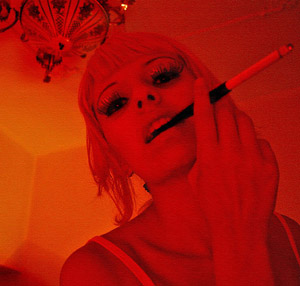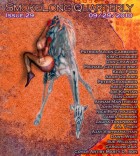The definition of “animal” changes throughout this piece. The protagonists of the story are initially animals, and this seems to be a source of strength for them. But there is also a darker definition of animals throughout, something more primal. How do you want your readers to see the word?
I hope readers associate the word “animal” with primal instincts, as you suggest, because that is what the story is about to me. There is an animal instinct for malice, but an equally strong one for survival, and the story brings the two together. Down at the word level, it’s interesting that our society calls child abusers “animals” and the FBI profiles them as “hunters”. I still haven’t decided whether the hunter in this story is returning from a tree stand or from lurking at school bus stops.
In the middle of the story the phrase “older browned ones” referring to blood stains was very powerful for me. It makes the violence of the story much more immediate. Did you see this as key to establishing the timeline of this story?
Yes, the story is so short and void of backstory that I needed to drop a few brief hints about the history of abuse here. The old blood stains do that, as well as the “remembrances” of the girls in the first few lines, which may not make sense to a reader until the end.
Why did you choose a bear and a snake?
I imagined that these girls would call upon animal energy that was linked somehow to what they had suffered. I guessed that the brute force of physical abuse and the insidious nature of sexual abuse that they experienced would lead them to pick a bear and a snake.
What other writing projects are you working on?
I’ve really fallen hard for flash fiction during the past year, and I’m getting pieces published and feeling somewhat comfortable with it, which is starting to make me a little restless. I don’t like feeling plateaued. I think the next challenge for me is writing longer stories, 3000 to 5000 words, with more thought to structure, character development and dialogue. I feel like I’m in training for a marathon, with the marathon being a novel, and so far I’ve figured out how to jog around the block. In workboots.
You say in your bio that your fiction is pale and cranky. Is all of your work like that?
I’m guilty of a little misplaced namecalling. I wrote this piece in March, which is my least favorite month in Cleveland – 31 straight days of cold, wet and gray. I’m sure that I was really describing myself at that point. I can admit it now because it’s September, and absolutely gorgeous outside. Today, any fiction I write will be ruddy and amiable.



 The SmokeLong Grand Micro Contest (The Mikey) is now an annual competition celebrating and compensating the best micro fiction and nonfiction online.
The SmokeLong Grand Micro Contest (The Mikey) is now an annual competition celebrating and compensating the best micro fiction and nonfiction online.